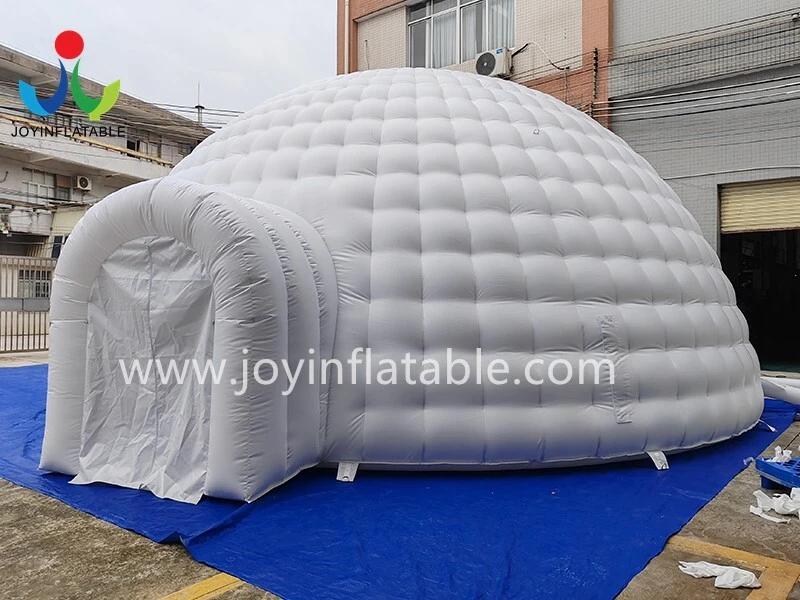The igloo tent has become one of the most talked-about innovations in outdoor living, camping, and event planning. Unlike conventional tents, these dome-shaped structures combine striking design with functionality, creating immersive spaces that can be used for anything from stargazing getaways to winter parties and luxury dining experiences. Their rounded silhouette, durable construction, and versatile applications have made igloo tent a preferred choice for both individuals and businesses looking for something beyond the ordinary.

In this guide, we will explore the design, features, uses, and advantages of igloo tents while uncovering why they continue to rise in popularity as a modern solution for shelter and celebration.
The Concept and Evolution of the Igloo Tent
Inspired by the strength and symmetry of traditional Arctic igloos, the modern igloo tent reinterprets this timeless design through contemporary materials and engineering. While early tents focused purely on utility, igloo-style tents bring both durability and visual appeal. They are designed to be aerodynamic, reducing wind resistance, while their rounded dome shape provides stability in various environments.
Manufacturers often use high-quality PVC, Oxford fabric, or TPU materials to create igloo tents that can withstand different weather conditions. Some models are inflatable, offering quick setup, while others use geodesic frames for enhanced structural support. This evolution has allowed igloo tents to transition from purely camping gear to multi-functional venues for both leisure and commercial use.
Design and Key Features
What sets an igloo tent apart is its structural brilliance. The dome-like architecture provides excellent weight distribution, making it capable of handling wind, rain, and even snow. Transparent versions of igloo tents allow panoramic outdoor views and natural light, turning a simple shelter into an immersive experience. Opaque or semi-transparent variations offer privacy while still maintaining the cozy feel of the dome.
Many igloo tents come with customizable features, including integrated ventilation, climate control, and LED lighting. Some larger designs even incorporate multiple rooms or sections, transforming them into mini venues for events and gatherings. This adaptability makes them suitable for camping, backyard retreats, corporate branding, and even luxury resort accommodations.
Popular Applications of Igloo Tents
The versatility of igloo tents is one of their greatest strengths. In the world of outdoor recreation, they have become popular for glamping experiences, providing campers with comfort and protection while keeping them close to nature. Their transparent walls make them particularly appealing for stargazing trips and romantic getaways.
Event planners have also embraced igloo tents for weddings, exhibitions, and seasonal parties. Restaurants and cafés use them as stylish dining pods during colder months, creating enclosed yet atmospheric spaces for guests. On a personal level, homeowners are increasingly setting up igloo tents in gardens or by pools as cozy lounges or private relaxation zones.
In commercial settings, branded igloo tents are being used at trade shows, product launches, and festivals where their futuristic design attracts attention and enhances brand presence.
Advantages of Using an Igloo Tent
The popularity of igloo tents stems not only from their appearance but also from their practical benefits. Their dome shape provides superior structural integrity compared to standard tents, making them more reliable in unpredictable weather. Inflatable igloo tents, in particular, can be set up within hours, reducing the time and labor associated with traditional event structures.
Portability is another key advantage. Igloo tents can be easily packed, transported, and reassembled at different locations, making them ideal for mobile businesses, outdoor festivals, and traveling exhibitions. Their thermal efficiency also ensures comfort—retaining warmth in colder seasons while allowing ventilation in warmer climates.
Additionally, the spacious interiors of igloo tents provide creative freedom. They can be decorated with lighting, furniture, or thematic setups, turning them into unique environments tailored to the event or experience.
Customization and Branding Opportunities
Another reason the igloo tent is highly valued in commercial use is its customization potential. Businesses can adapt them with logos, color schemes, and interior designs that align with their brand identity. Some large igloo tents even support projection mapping, turning the entire dome into an interactive display.
For private use, customization can range from simple lighting setups to elaborate luxury interiors, allowing hosts to create unforgettable atmospheres for birthdays, anniversaries, or seasonal festivities. This ability to adapt both inside and out ensures that no two igloo tent experiences are alike.
Sustainability and Eco-Friendly Impact
As sustainability becomes a priority in event planning and outdoor recreation, igloo tents present a greener option compared to permanent construction. Their reusable and durable design reduces waste while providing long-term value. Many manufacturers are now focusing on eco-friendly materials, recyclable fabrics, and energy-efficient accessories such as solar-powered lighting systems.
This shift aligns with the increasing demand for environmentally conscious event solutions, making igloo tents both stylish and responsible.
The Future of Igloo Tents
Looking forward, igloo tents are expected to integrate even more advanced features. From smart lighting and automated ventilation systems to eco-friendly materials and solar-powered climate control, these tents are evolving to meet modern demands. As travel and events continue to emphasize unique and immersive experiences, igloo tents will likely become an even more central feature in outdoor design and hospitality.
Conclusion
The igloo tent represents far more than a temporary shelter—it embodies a fusion of creativity, functionality, and innovation. Its dome-shaped design, versatile applications, and ability to adapt to different environments have made it a popular choice across industries and lifestyles.